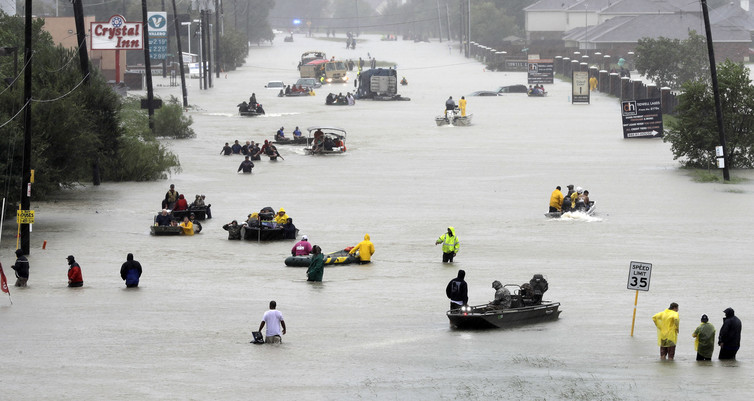
_____________
Neil Grigg, a
CSU professor
of Civil and
Environmental
Engineering,
wrote a piece for
The Conversation
in August about
flooding from
Hurricane Harvey.
______________
Eclipses. Hurricanes. Labor unions. Noise pollution. And languages around the world.
These are just a few of the topics Colorado State faculty and researchers have written about for The Conversation in the past 16 months. To date, 50 authors have contributed 67 articles that have been read by more than 1.5 million people in countries across the globe.
“Wow! 8500 reads in 24 hours!” wrote Michael Gavin, associate professor in the Department of Human Dimensions of Natural Resources, after The Conversation posted his article about why humans speak so many different languages. “Can’t imagine the academic articles the piece links to ever getting that.”
Pieces for The Conversation aren’t long – between 800 and 1000 words – but like other CSU faculty, Gavin found them a great way to publicize his research to a general audience. Started in the U.S. in 2014, The Conversation is an online platform that is an independent source of news and views from the academic and research community, delivered direct to the public – with lofty goals.
Want to pitch your ideas directly?
Jennifer Weeks, an editor for The Conversation, will be on campus Oct. 26-27 to talk to researchers who would like to write. On Thursday, she will be in the Lory Student Center Room 372, 9 a.m.-noon, and in the Foothills room in the Collaborative for Student Achievement on the north side of the stadium, 2-4 p.m. On Friday, she will be in the Morgan Library Event Hall, 9-10 a.m. All faculty and researchers are invited to stop by and share ideas anytime during those hours
“Access to independent, high quality, authenticated, explanatory journalism underpins a functioning democracy,” according to The Conversation’s mission statement. “Our aim is to promote better understanding of current affairs and complex issues. And hopefully allow for a better quality of public discourse and conversation.”
And the nonprofit aims to rebuild trust in journalism, with open access and free flow of information. Publishers are encouraged to use The Conversation’s content free of charge. The only caveat is that the content remain unchanged; what appears is exactly what the author approved after working with The Conversation’s professional editors.
Outlets that regularly republish CSU articles include Quartz – a site owned by The Atlantic, with about 40 percent international readership – New Republic, Business Insider, Newsweek, Associated Press, and several TV and newspaper chains.
Wise investment of time
“I’ve been very pleased with my experience, and I’m convinced that it’s a wise investment in time,” said Matthew Wallenstein, director of the Innovation Center for Agriculture. “My articles have led to additional media inquiries from TV, radio, and print journalists. In addition, I’ve been contacted by industry, farmer groups (and invited to their meetings), farmers, and others. My takeaway is that these pieces are not just more visible to the public than academic publications, but increases our perception as experts to a range of stakeholders.”
CSU is a partner institution with The Conversation, with funding contributed by the Provost’s Office, the Vice President for Research, and the Division of External Relations.
Four days after Gavin’s article on languages was published, it had been read more than 150,000 times. But that’s not all.
“The effect on the altmetrics for the linked academic articles is also amazing,” he said. “Virtually overnight the paper outlining the simulation is up to No. 2 all time in altmetrics for the journal Global Ecology and Biogeography, and our related review paper shot up to No. 20 all time in Bioscience.”
And a month later, Gavin had more follow-on to report: “I gave an interview yesterday for an NPR program that talked about work on language diversity and it also included talk about what is Human Dimensions of Natural Resources.”
Anyone, including Ph.D. students and post-docs, is encouraged to share their research with the world through The Conversation. For more information, contact Kate Jeracki at kate.jeracki@colostate.edu, or go to theconversation.com to register as an author and contact the editors directly.